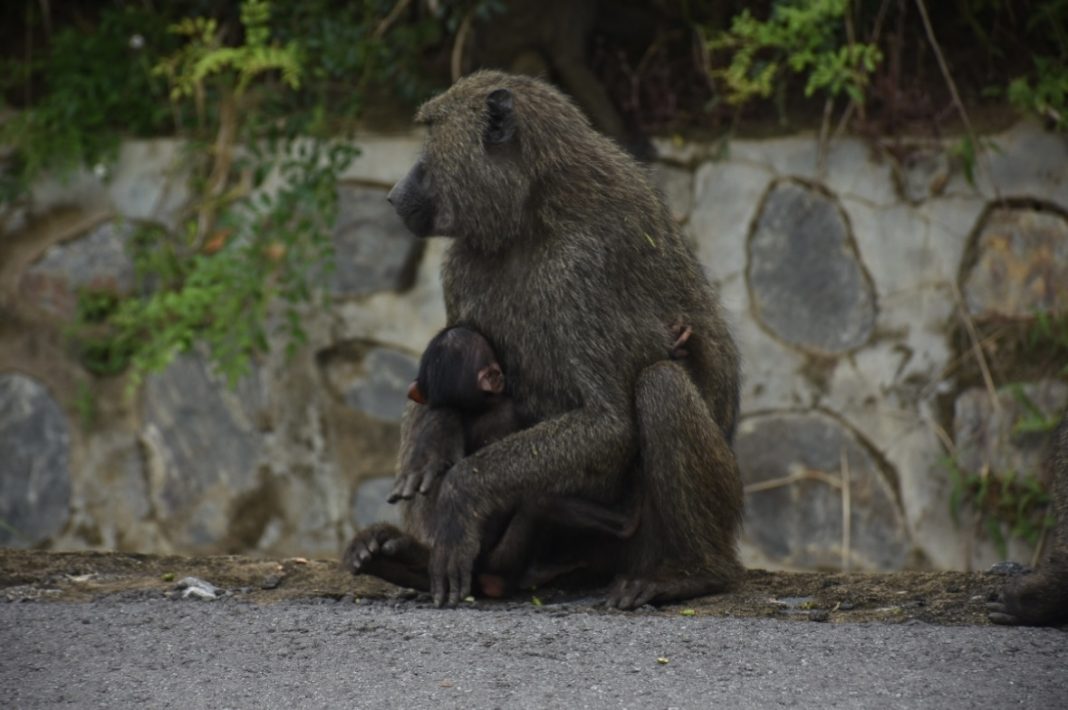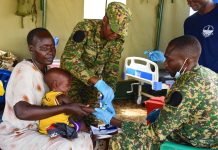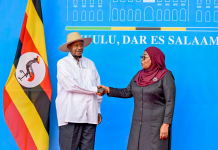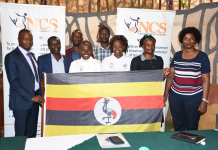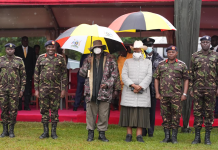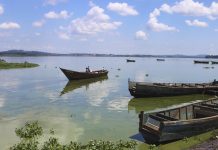By Sarah Mawerere
At dawn, men and women rangers gather for instructions for theday’s work. This routine however changes, as some rangers spend days and nights out in the park to guard and protect wildlife from poachers, snares, harm and other eventualities.
For the women rangers, it is their nature and resilience that makes them remarkable. They could get bias from the public, but their courage never hesitates.
Unlike the confrontational image often associated with enforcement, these women use empathy as a powerful tool. Their calm and respectful approach allows them to engage meaningfully with nearby communities; listening, educating, and building trust. Society, once skeptical of women in uniform, now welcome them with admiration and cooperation, recognizing that these rangers protect not only wildlife, but also protect for the future generations.
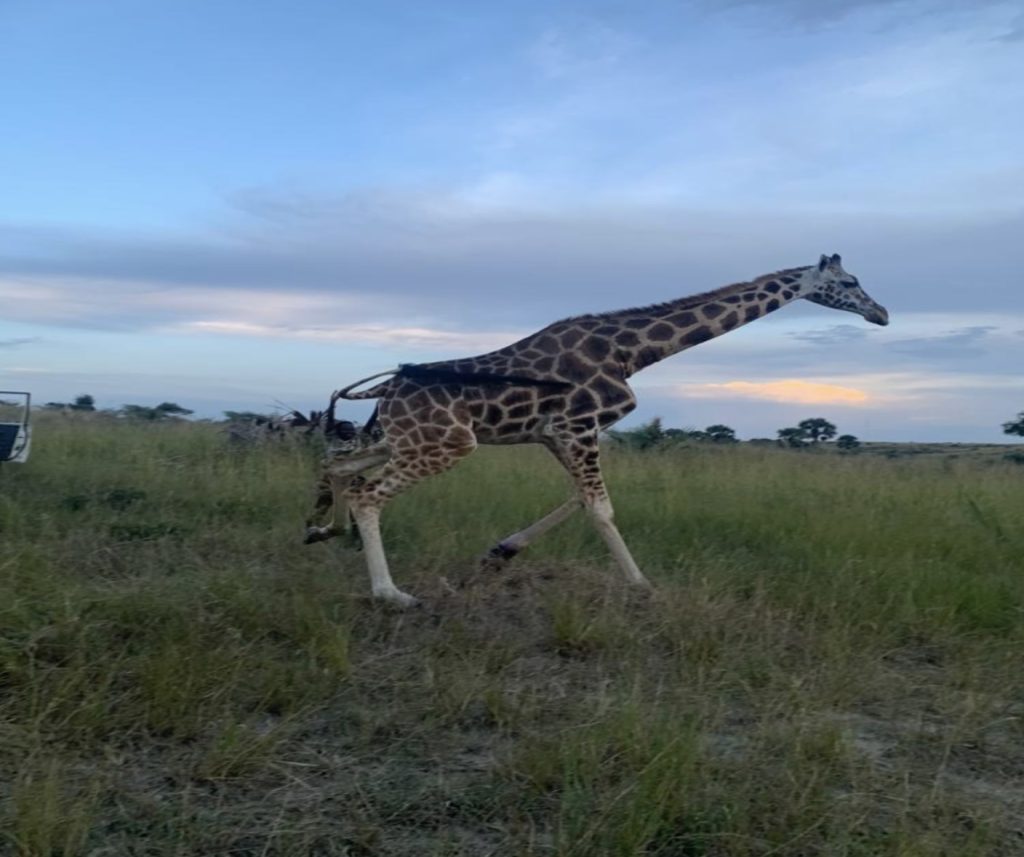
In groups of three or four while moving side by side with their male counterparts, the female rangers go on mission to protect wildlife and the environment; they withstand longer working hours, even for days in harsh terrain, risking lives, while the women proving their courage that has no gender. Beyond guarding wildlife, they carry a deeper mission of changing perceptions in communities and inspiring a new generation to see conservation through a woman’s strength and compassion. They rescue animals tied by snares laid by poachers, they treat the animals when injured and drive back to the park wildlife that wonder to the nearby communities.
When Private Akello Robinah Brenda at Kidepo Valley National Park was engaged, she asserted that she is a proud ranger who looks up to the future development, saying- what a man can do; a woman can as well do.
Listen to the interview below in which Sarah Mawerere of UBC engaged Private Akello
Beyond their ranger work, some of these women carry another silent strength of balancing between the duty and motherhood. After long days in the field, many return home to care for their children, cook for their families, and nurture the very lives they risk their own to protect. They shift from the wild to the warmth of family life endurance. For them, being a ranger is not just a job but a calling that runs alongside their roles as mothers, wives, and community workers. Their resilience defies stereotypes, showing that a woman can support life in one hand and guard nature with the other.
Caroline Amen, currently working at the Murchison Falls National Park is not different from others when it comes to working as female ranger. She said the routine normally starts early morning where all rangers assemble for instructions and deployment. After this, they take different directions going far in thickets to guard wildlife for the good of the country. “I always take to the direction of northern sector where most of the giant animals like giraffe, elephants and buffalos are found”. “I go with my colleagues to watch for poachers who come to poach, to look for snares laid by poaches to trap animals and to prevent the community members who come to the park to plunder the resources by cutting trees and pit sawing. When these resources are exhausted, the animals will lack habitat and will disappear, yet they are loved by tourists who come, pay the country to see them”. She is positive about the importance of conservation.
“I picked interest to join ranger work after visiting the Zoo way back in primary school”. “From that time, I appreciated the importance of wild animals to the country; they bring in money for the country from the visitors who visit to see them, but also conserved for future generations to see them”. Amen ushers in her interests in conserving”. She happily noted.
At the age of eighteen and after sitting her senior four, Amen joined Uganda Wildlife Authority in 2018 for ranger work. She zealously said she used to like pet cats and dogs at home and now that she is a ranger, she is committed to conserving wild animals. “I got interested in joining range work because I loved animals and said to myself that I can manage it, although some close friends and relatives somehow discouraged me to join, saying it is work for men. That men can tolerate work in the wild and sleeping in the bush”. Yet here I am doing it! Amen joyful raised her voice.
“Since I was not doing anything home so I seized the opportunity and joined”. I feel the pride when I can work in a team to rescue animals from snares and traps”. Amen proudly narrated.
In most cases, Amen said, they take their male colleagues as brothers. “We wake up, go to assemble, then go for surveillance, and when we find an animal with a wire snare, we rescue it. “The process of rescue is that; the animal is worked on when it is under drugs so we clean the wound if it is wounded, we put iodine, spray and use fly repellants”. However, we have to use protective gear like gloves, masks and sanitizer. “This helps us to protect ourselves from catching zoonotic diseases as well as avoiding infecting the animals too by us”. She further said. “I am proud of myself that I can in a team of male colleagues dart a huge animal like a giraffe using a dart gun; it goes down on the ground when it is silenced, we prepare it then the veterinary team treats it. She said. The veterinary team treats it. She said.

National park, was driven by passion and pride to join ranger work. “I could get impressed by women soldiers so I got interested to join this force when an opportunity came a long”. I had much passion to conserve the animals for the country’s development since these animals attract tourists who come and pay money to watch these animals and view the scenery as well”. Ateng resounded while looking at warthogs within the vicinity.
“When you walk with a gun and in this uniform, you feel the pride as a woman to do such work which was predominantly for men only”. Ateng added.
“I do not see a difference between a man and a woman in terms of work. We do the same work, we do the work together like patrolling ambushes, guarding, marathons, and if there are problem animals that go to the community, we make sure we bring them back to the park”.
“We have outposts where we go to guard, there are no special items or amenities in the bush but we carry some basics with us like some clothes, a water bottle and some ranger ration food”. “This keeps us going and we stay there on alert working. There are no special amenities in the bush like water, soap and shelter. It is an experience to tell; women are determined, they can move in groups of three or four with their male counterparts along in the wild protecting wild animals. She further noted”.
“However, the differentiation of our sex does not stop us as women to join ranger work”. “We normally get some consideration for example; if a woman ranger conceives, she is given maternity leave at the time of delivery and when the child is about five months, she returns to work but can be deployed to guard like at headquarter”. Ateng further explained.
Caroline Amen moves with courage beside a team of rangers in the vast wild of Murchison Falls National Park. Beyond this, she with her colleagues respond to calls to rescue wildlife that stray to the nearby communities in Buliisa, Masindi and Pakwach. For example, in the morning of eighth June 2022, her team was called by to rescue a puff adder venomous snake that had beaten a dog and was threatening a community in Buliisa. Without hesitation, Caroline stepped forward, gently using her skill to capture the reptile. But in the tense moment, the snake struck and bit her palm near the thumb. The pain was sharp, but she was treated. Her fellow rangers rushed to her aid, and the snake was safely contained and released back into the park. Much as she still feels some pain on the part of the snake bite, the incident has not weakened her. It became a reminder of the risks and sacrifices that come with the mission to protect both people and wildlife.
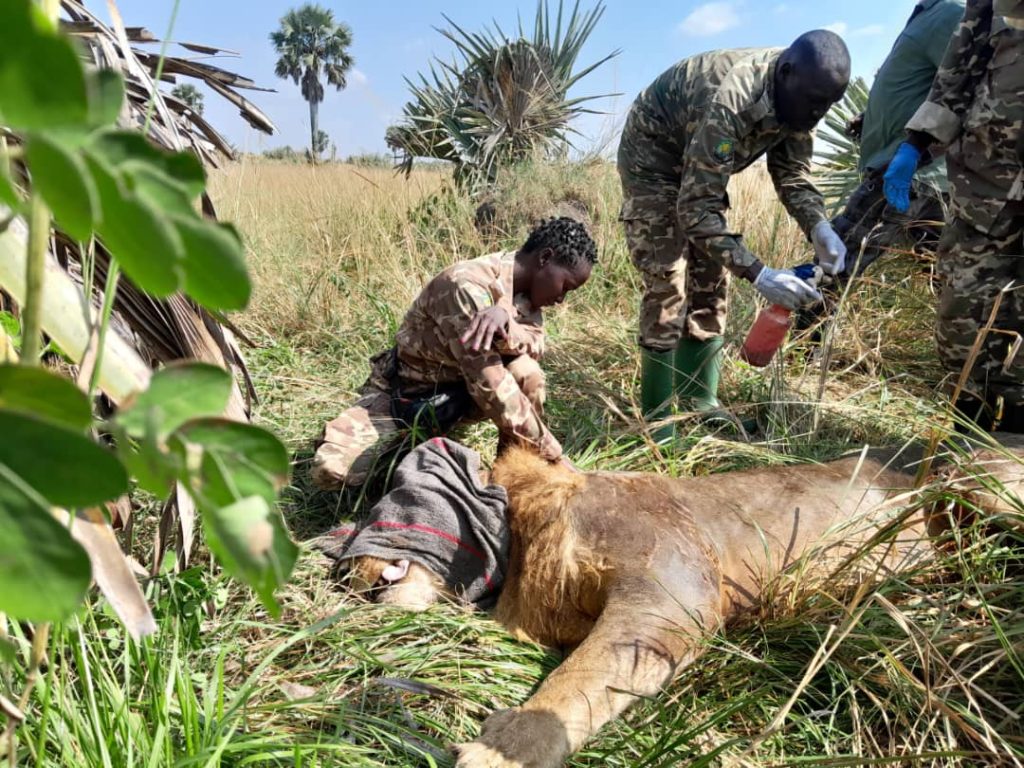
Beyond the day’s patrols, female rangers also play a crucial role in community outreach. They visit villages to educate residents about protecting wildlife and reducing human-wildlife conflict. Many locals listen more openly to women, especially on the benefits of wildlife conservation and the provisions to the community as a result of this.
Uganda Wildlife Authority Commander- Out post detach of Karuma Wildlife Reserve- Coporal Owiny Mercy Akoko who has served as a ranger for twenty one years said that they are trained with the goal to conserve for generations. “When you have the skill and tactics, you work with confidence although there are unpreditactable circumstances like armed poachers and ambushes that can overwhelm”. “However, women rangers are deployed in a group with at least two or three men rangers among”. She said.
For extended patrols, which she said can go for two days while in the bush patroling and suveilling, women can not be a lone. They do the work in company of the male rangers so that where wonmen are weak, the men can carry on and back up. “There is no problem women doing guard duties at night-they do it together with the men even for marine guard, they do it with the men to guard against marine crime”. Owiny adds to what her colleagues earlier said.
Asked about how she has managed ranger work for twenty one years, she said that it is a duty that she joined to do willingly.There is always consideration given to the women rangers especially when she is expecting or under her montkly periods, the women can not manage to go for extended duties in the park. They are deployed to guard gates especially where important equipment is kept.
Akoko is a proud mother of threee children, and happily married to Private Oketayot Geoffrey, her husband she said she met over twenty one years ago, when they both had just joined the renger force. “We could be deployed together, and since we joined the force when adults, we decided to become friends”. She added that you can become companions, it is allowed. “And those married to civilians, their men are also allowed to come over and meet their spouses. She further explained”.
A Changing Landscape
Uganda’s wildlife conservation landscape is evolving. The Uganda Wildlife Authority in partnership with civil society organizations, Embassies and some individuals of good will have joined efforts to improve upon the welfare of rangers. This is aimed at increasing the morale and yet make the lives of the rangers fit to continue protecting nature. Activities such as theannual wildlife ranger challenge and fundraising drives, are held to raise resources for rangers’ welfare.
On 20th September 2025, Uganda Wildlife Authority announced a salary increment for its wildlife rangers from a gross salary pay of about 770,000 Uganda shillings to a million shillings per month. This will not only increase their morale to protect the wild animals and environment, but to attract more young people to join the ranger force for conservation.
The embassies in Uganda and other partners, have focused also on caring for the female rangers through a range of benefits for their general health.
Listen to the Netherlands Ambassador to Uganda about thesupport to improved welfare of the women below.
Video of the Ambassador thanking the female rangers for participation in the 2025 wildlife ranger challenge
Beyond Uganda, in Zambia Astrida Malambo- Wildlife Police Officer wanted to work in conservation since she was a child. “I officially began in 2020 as a community scout under the chiefdom”. She has always loved nature, and that the passion is what led her to join the conservation department. When she started, people discouraged her, saying there was no money in being a community scout and that it was a waste of time. But she brushed off all that.
“There are very few women in this field, and sometimes, when you’re given a leadership role, people doubt your abilities”. “Itcan be emotionally difficult but I stayed focused, and now people from my community, both men and women, admire me and ask how I managed to join this department”. She was quoted to have said this recently.
Despite all the risks, ranger work is interesting as it gets rangers going. The assignments kick off in the morning and they go to guard and protect wildlife. This goes on throughout, and when they get used to it, they begin appreciating the tremendous work done to protect wildlife. It is done with the composition of different teams that include guards, veterinary and researchers who gather information on a daily that is forwarded to the higher levels for decision making.
“I encourage my daughters to be confident and know that being a girl should never limit their dreams”. “They are already telling me they want to do the work I do”. Last quote of Malambo.

So many women rangers in Kenya, South Africa, Zimbabwe and the number of women rangers is increasing not only in Uganda but elsewhere including Kenya, Zimbabwe and South Africa. They are contributing to conservation of wildlife and environment for the development of Africa’s economies.
Female rangers, as role models, educators, and leaders, are rewriting the story of what’s possible for women in conservation and beyond. Said Holly Budge, Founder of World Female Ranger Week & How Many Elephants Non-Governmental Organization.
World Female Ranger Week (WFRW) is a global initiative founded and hosted by UK-based charity- How Many Elephants. It celebrates and supports female rangers working on the frontlines of conservation around the world. Through storytelling, advocacy, and collaboration, How Many Elephants has helped elevate the visibility of these courageous women, reaching over 500 million people through global media coverage and on-the-ground campaigns.
Gender Challenges
Ranger work is one of the most unsafe professions in wildlife conservation. Each day, rangers step into unpredictable areas in the park; facing dangers ranging from armed poachers, wild animal attacks, to harsh weather conditions. But for Uganda’s female rangers, go beyond-they perform multiple roles of protecting flora and fauna from human threats, patrolling and guarding conservation of landscapes alongside their male counterparts. They face gender bias, physical exhaustion, and long separations from family especially those that are far away.
Conclusion: Ranger work is a whole chain of activities. It is not only about wildlife conservation, is not only about saving animals, but also about courage to work the day. For the female rangers do not carry just rifles, but the weight of responsibility they carry to protect nature for the generations yet to come.


